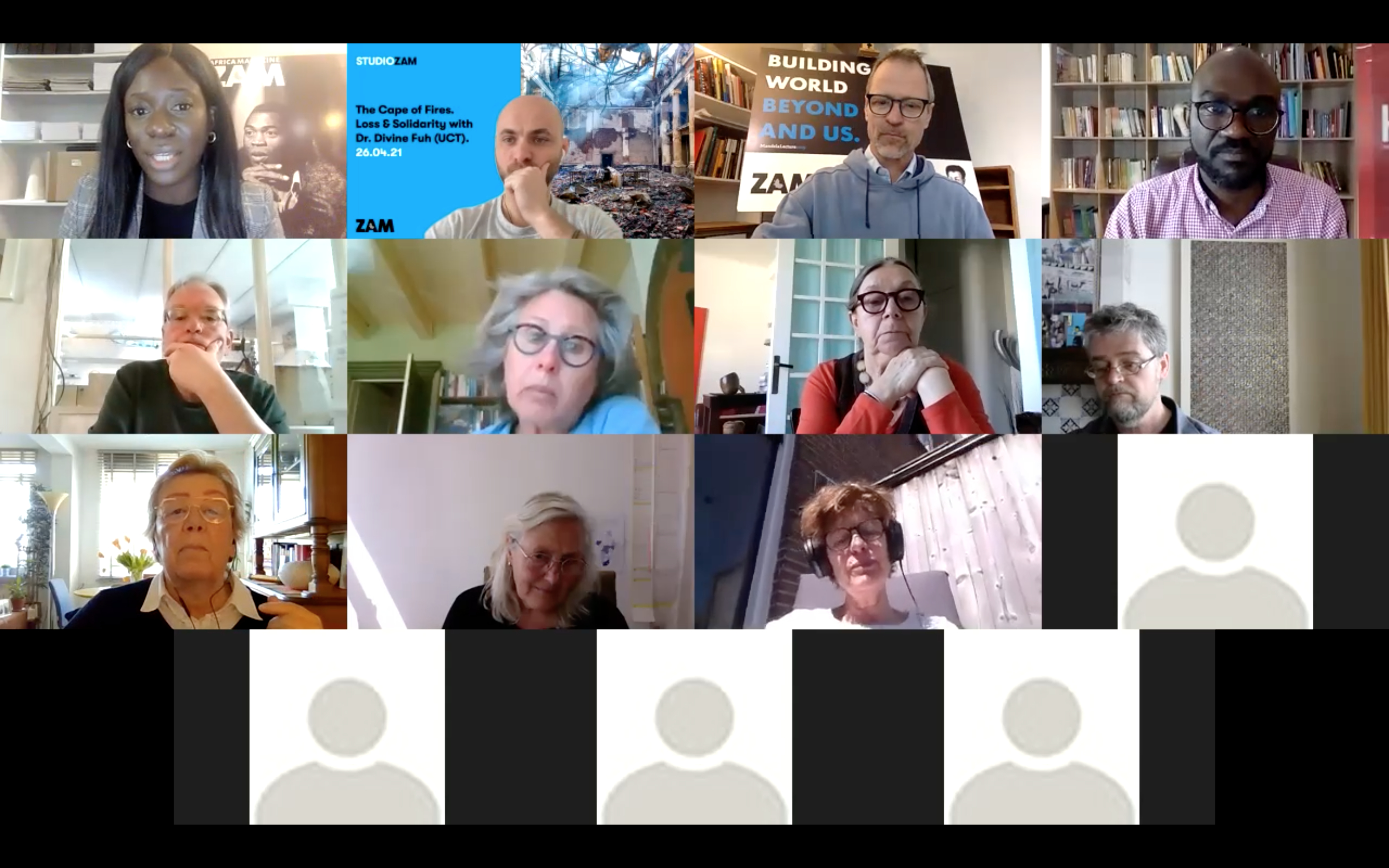In conversation with Dr. Divine Fuh about the recent burning down of the University of Cape Town’s library.
In an online Studio ZAM lunch time on Monday 26 April, 2021, the social anthropologist and director of the Institute for Humanities in Africa at UCT spoke about loss and solidarity with efforts to build what has been destroyed. Fuh has also been a visiting fellow at the Africa Study Centre and was involved in Langa Research and Publishing as well as the African Boon Collective.
That Day
“On Sunday 18 April I was at home when the fire started. The UTC is the top university of the world and voted one of the most beautiful campuses around the world. When I am at home, I can see the Table Mountain. I was planning to walk up to the mountain. I first read the news in the morning about a small fire, by afternoon the fire was threatening to reach the campus. When the news spread that the fire caught the African studies library everybody was in shock. I had a feeling of dying when I saw the library in flames. Just a few weeks before, we had a lot of debates and fights at the university. That weekend the Johannesburg General Hospital Cancer Department also caught fire. There was also a burglary of the office of the official Zondo Commission into state capture during the Zuma presidency.”
“When you see the pictures, it seems like witchcraft. The Western Cape in particular is a fire prone zone. It is a very strong fire season from December through April. It might not be in the news but it happens very often. The strong winds drove the fire and then faith. The fire decided that this place of decolonisation had to burn down.”
The Loss
“The library is the university. The knowledge decolonisation started there. It is one of the biggest libraries in the continent with more than 80,000 books and 3.500 movies. You can’t help but feel depressed. Just the African studies section and the reading room has been gutted, but the vault preserved a lot of documents. Luckily the fire detection system triggered and contained the fire. Not the whole library burned down. But the fire is fought with water and the big amounts of water create its own problems. So there has now been calls to ask for volunteers and money. We have been lucky that people helped with saving material. In the weeks ahead we have a better picture on what got lost what was lost.”
“Everything in the reading was burned down. Some of the ANC archives was in the basement and so far, the basement seems safe. Once we have a full picture of what has been lost and not, they will make a report everyone. Many organisations are busy with it.”
The Perpetrator
“I describe the fire in a couple of ways. First, it is depression and sadness. It is simply too much. Then it’s tragedy. This country is an archive. Inscribed on this town and on the bodies of the people are the archives of violence. We are told that the fire was created by a ‘flagrant’. It is a term that is being used for somebody classified as a non-human. South-Africa and Cape Town are one of the most unequal places in the world. Somebody says it was somebody who tried to cook, another one claimed that some started the fire on purpose. It is very sad that within a place that is one of the richest places on the continent, someone needs to start to a fire on the mountain in order to cook. The person who is arrested is a Tanzanian national who said he has been here for eight years. He came to try to enroll in the university. It is a story of disconnection, a story of poor relationships. It is a kind of a story of our own ethics to others and this place.”
The Support
“The city has actually been kind to help. Both to stop the fire and to accommodate the students. There is now a platform to support, you can help financially. The other kind of support is about the materials that have been destroyed. We are now looking for stuff that has been taken out of the continent. It has to be brought back here. So, we are looking for donations to fill the archives again. The knowledge infrastructure needs a lot of support. We have to make sure that we don’t make this a one-off thing and support the long-term projects.”
“Over the past year the UTC has been at the centre of works on the archive. The colleagues of English studies have worked on black archives. Many projects have been done to work on these archives. We now have to think of the future where data is more important and archives are the centre. In decolonizing archives, you also need the archives and create knowledge around the world. We should push this message through collaborations and debates. I hope you donate lots of million!”
Hope
“We should take this as an opportunity or as a hope. We should invest in new things to improve. We should try to invest in project that support knowledge improvement. There are lots of archives that do great work and here we have the infrastructure to place them. There are many places that are looking for work, so if can find a framework to find support for different places that are building up the knowledge infrastructure in Africa.”
For ways of supporting the recovery of the library follow this link.
Watch the full conversation with Dr. Divine Fuh below.


